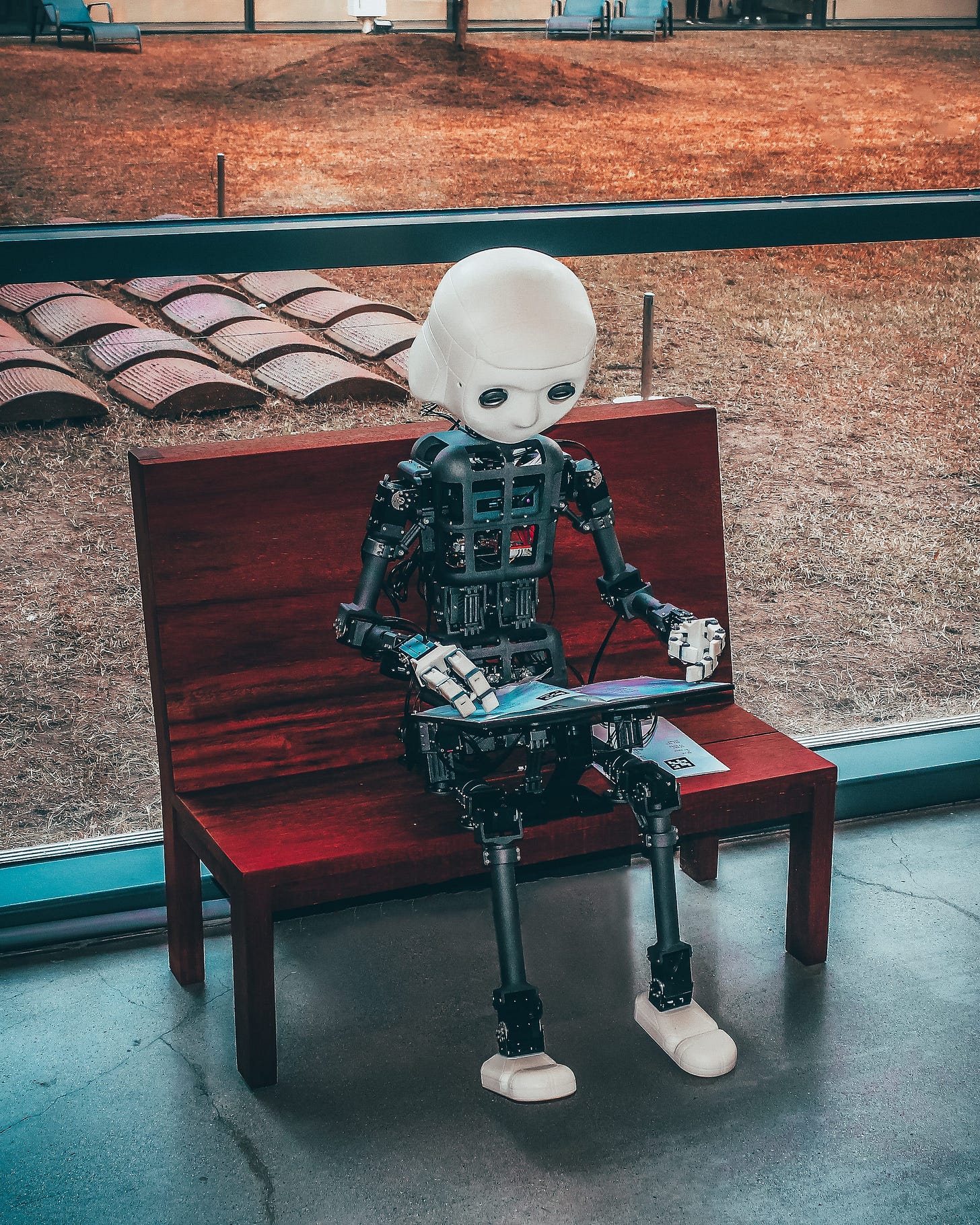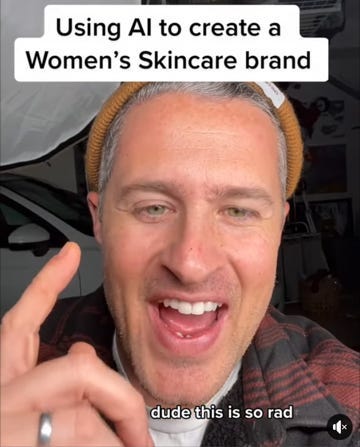A.I is spoiling the fun of what it means to be human.
Being human is supposed to be challenging. Life is far from perfect. Work is supposed to challenge your capacity, your brain cells, your will and limits.
That’s how we, humans, have been growing for centuries.
Now, because of the rise of the ethically questionable company Open.ai and its product Chat GPT, all this seems in danger.
Let’s dive deeper into why A.I might be a massive danger to humanity. Or is it saving us from our demise? Why are we falling for it by the millions? What are the short-term consequences for your work?
And finally: What can we and should we do about it? Or is it all innocent play?
This is not written by A.I
The danger of A.I in a nutshell
The problem is that A.I is creating a fake world growing by the second.
We live in a world where information is everything. People are glued to screens for up to 14 hours a day. Imagine that soon, You don't know which text, image, or video is fake or real.
Let the consequences sink in for a moment.
The information warfare that has been going on for centuries, has reached a point where people can’t reach a consensus anymore on the nature of reality. You are spoon-fed biased info that either enhances or weakens your worldview. This has created a massive polarization.
The result has been a destruction of our social fabric, the end of democracy, people caught up in constant confusion, social media outrage and toxic in-group dynamics.
A.I will go next level. It will crush reality completely.
This will make ordinary people decide to give up finally. Live in a fake world altogether. Made high on chemical happiness.
They will stand in line to receive their neuro-link, the chip, the lifelong connection to the state-run blockchain. Just to escape the void, the confusion, the constant stream of things that hit their weak spots. The destructive digital noise.
They become complete and utter digital slaves, living in an illusion. Resistance is futile—the wet dream of technocrats like Gates and Zuckbug.
The end of freedom for most of us.
Why do people fall for it
I couldn’t sleep last night and watched some reels. Somehow the algorithm had decided to vomit a plethora of reels into my brain of people showing how they make thousands of $$$ using ChatGPT.
It can write a children’s book within 5 minutes. Add creative commons images, upload to gumroad, and voila, you’re done. It can create a voice-over about any popular topic, like losing weight. Add some pictures and put them on your new YouTube channel, and BOEM, you’ll be a millionaire overnight.
It’s easy to see that people using ChatGPT are lazy, but also because our economic system and its incentives are rotten to the core.
It has made us compete with everybody else over never enough money. Or as a good friend told me last night, You exchange your scarce valuable time for something, money, that in essence has no value at all since it can be printed indefinitely.
The economic incentive, or myth, of scarce money and scarce time naturally pushed people into needing to make money faster and faster. They will give up ethics and values and choose the following online tool that delivers a product that can be sold faster than the competition, AKA real thinking and acting humans.
They will lose.
People are falling for A.I because of the rotten economic perverse incentives that are, in fact, anti-human.
What are the consequences for your work?
Sure, we’ll still need cleaners, drivers and cooks until the autonomous cars are there, the robots take over MacDonalds, and walls become self-cleaning.
Some of these ‘innovations’ have been tested already.
Or what about Smart Courts being used in the Red Flag Country from 2017? There, people can experience first-hand what a sneak peek of Blade Runner world looks and feels like.
You spit your gum on the pave-walk. Next, you’re being picked up by an autonomous armed drone, pushed into an autonomous Police car, and sentenced by the Algo-Judge.
You can’t argue with a robot. But what if they get hacked by your enemies to frame you?
Happy for some of us, the economy will still need people that make decisions, use their intuition, or deal with complex scenarios—something present-day A.I struggles with. Or work that includes too many irregularities for A.I to solve, or that’s still too expensive to unleash the army of robots upon.
The estimation is that in 2025, 85 million jobs will be replaced by A.I, in the U.S. That’s a lot.
Here’s a list. Are you on it?
Customer service executives
Bookkeeping and data entry
Receptionist
Proofreading. Thank you, Grammarly.
Manufacturing and pharmaceutical work
Pharmaceutical labs
Retail services
Automated services
Courier services
Soldiers
Taxi and bus drivers: Self-driving trucks could replace 1.7 million American truckers in the next ten years.
Market research analysts
Security Guards: There’s an estimated 84% chance that AI will fully automate this profession. (source)
I am happy I am a hiking Guide. I interact with nature and real people.
Where are the ethical commissions?
It seems A.I and machine learning are part of exponentially growing tech that’s hard to stop.
There is this optimistic graze around ‘New Revolutionary Tech’, as if humanity chooses to be this young adult in puberty, loving to play around with new gadgets, while not being grown up and mature enough to look over the trees and see the negative consequences in the future.
Corporate short sighted for profit models are highly responsible for this.
And consequences there have been for technology that we once embraced to change everything for the better;
The Green Revolution introduced Round-Up. This poison would save 10 million people from starvation, as the media sold it back then. It’s made of glyphosate, the herbicide introduced by Monsanto in 1974. The second and third-order effects we feel now. It has poisoned our planet, water, forests and land. Some experts say we have 70 harvests left, and thus we’re steaming ahead to our 6th major extinction event.
Nuclear power & bombs started the arms race balance after the cold war, after ending the second world war. Some call this a positive outcome. The second and third-order effects are ‘accidents’ like Chernobyl and Fukushima. The levels of radiation and damage are still unknown since corporate interests are too high and the reputations of countries and Governments are at stake
Crispr and m-RNA technology is the new kid in Med. town. Let’s talk again in 50 years when the effects have become clear to humanity. And when we still exist.
This paragraph is about what we can do and maybe should do.
We need to become mature.
We must prove to ourselves that we’re good stewards of your technology. For this, the corporate for-profit model must change, adapt, or be legally bound. This is difficult because, for example, big tech and big pharma completely bought the regulators.
Sure, there are ethical committees that work. The Chinese doctor creating the first gene-edited designer babies was sent to prison after the babies were made.
Probably the big tech A.I investors bought the ethical commissions as well. That’s how this world seems to work, regardless of positive news that, for example, Singapore decided to wait with their Smart Judge. Since 2013, movements like Human Rights Watch try already to stop the rise of killer Robots.
What happened in 10 years? Well, The U.N. is still struggling to find a legal framework. Keep on struggling Gutierrez. Meanwhile, the Killer Robots are here, so let’s design some regulation. Where did we hear this before?
That’s how humanity works. We create something since we can, and then start to ask questions. Ethical committees and boards of elders should look into the future and decide if we need some potentially bad stuff!
Instead, they’re bought by the immense money power of the corporate world selling the product, misleading the audience through the media that they also possess.
Why Open.AI is not different and probably even more dangerous
Open.AI, the creator of ChatGPT, went on the same road. Its ethical founders wanted it to be a lab to experiment transparently for the sake of society, not a for-profit A.I company. This changed rapidly when investors like Microsoft were allowed in.
…many in the AI community see OpenAI’s turn toward corporate interests as a huge moment for AI and the world — not just as a betrayal of OpenAI’s founding principles but as a spur for the company to launch new AI products as quickly as possible, an attitude many think could have dangerous consequences — The Verge
Here we go again—the multi-polar trap. Companies need to compete with others, introduce products fast, without proper testing, or even better, ask questions about future negative consequences or short-term harm.
…Before they make the freakin product.
When this seems the reality, for now, folks, the only way out seems to feel it to heal it. When it’s one to twelve, maybe our tech billionaires releasing this powerful A.I realize they can’t leave the planet. Their bunkers aren’t strong enough. And the A.I might be after them.
Maybe we/they need to learn this way. To self-destruct, and build anew on different values with different systems. On the ashes of our greed.
Round Up. Sorry, Rap up
Some of the tech that humanity once invented often turns out to be helpful. Although it’s mostly first tested as weapons.
A.I has some amazing use cases where lives can be saved. Think of the dangerous jobs department like mining, machine assembly, or the modern-day battlefield ( that is when you still believe in war).
Here are three examples of how A.I can bring humanity tremendous value
Overall, the conditions for tech being of use or going rogue on us are;
Who owns the tech?
What intention is behind its use?
The model we’re in right now is highly flawed and dangerous and leads, according to deepthinker like Daniel Schmachtenberger, to civilization collapse.
Exponential growing tech in the age of quantum computing, machine learning and A.I, coupled with a predatory capitalist system that mainly runs on perverse incentives, will self-terminate — Daniel Schamchtenberger
Never forget: A.I is a product driven by a for-profit model.
It’s a product of companies owned by investors like Gates and Musk and a handful of invisible people that profit from conflict, confusion and war. That laugh and drink Champagne on the demise of humanity.
It’s fed data, and at the end of the day, it is your life energy. Your attention.
Don’t become useless food for machines without a soul.
The solution is to stay human, have flaws, fall in love, take care of a garden, and take care of your community, of the elderly, in a human way. Take care of the people close to you.
Minimize the impact of tech on your life where it’s not needed and where it makes you feel hollow.
The one solution that Daniel Schmachtenberger found and that I like is this one; We think we’ve become Gods, but we don’t have the love and wisdom of Gods. We need to become collectively wise. And stay connected to our love.
We need to grow the f*ck up before it’s too late.
Lucien Lecarme
Read more on how not only to survive the great reset but thrive while enjoying humanities rebirth






Brilliant summary I have nothing to add you have covered it all. Except to say if the only the mainstream news would publish this article. Alas no, they are sold to the AI. What may save us , is the screaming later by those who want to stay human and connected to the real world. Let's hope there will be enough of us left.